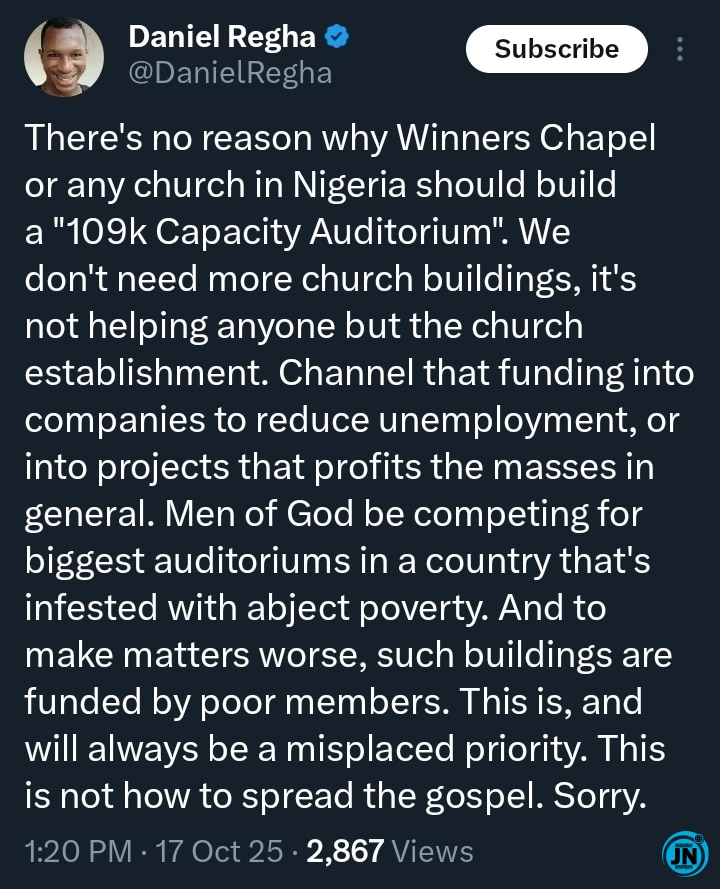Nigerian social media critic and influencer, Daniel Regha, has once again sparked conversations online after openly condemning the growing trend of Nigerian pastors and church founders investing heavily in the construction of massive church auditoriums instead of industries that could create jobs for the unemployed.
Taking to his official X (formerly Twitter) account, Regha voiced his disapproval following reports that the Living Faith Church (Winners Chapel), founded by Bishop David Oyedepo, is nearing completion of a 109,000-capacity Ark auditorium in Ota, Ogun State — one of the largest church buildings in the world.
According to Regha, while churches play a spiritual role in society, many of their recent activities appear to prioritize prestige and material expansion over real socioeconomic development that benefits the public.

Regha slams church expansion as “misplaced priority”
In his detailed post, Regha questioned the motive behind constructing such enormous buildings, describing it as a “misplaced priority” that reflects the growing commercialization of religion in Nigeria.
He wrote: “There’s no reason why Winners Chapel or any church in Nigeria should build a ‘109k Capacity Auditorium’. We don’t need more church buildings; it’s not helping anyone but the church establishment.”
“Channel that funding into companies to reduce unemployment or into projects that profit the masses in general. Men of God be competing for biggest auditoriums in a country that’s infested with abject poverty.”
He further emphasized that the problem is compounded by the fact that these enormous structures are often funded through offerings and tithes contributed by struggling church members. “And to make matters worse, such buildings are funded by poor members. This is, and will always be a misplaced priority. This is not how to spread the gospel. Sorry.”
Public reactions divided over his criticism
Regha’s statement drew widespread attention, quickly generating thousands of reactions from Nigerians across social media. While some agreed with his perspective and commended him for speaking up, others argued that churches have the right to use their resources as they please.
Supporters of Regha’s opinion pointed to the growing unemployment and poverty in Nigeria, arguing that such massive projects reflect misplaced moral and financial priorities.
Dan Kube commented: “Winners Chapel is one of the most successful business enterprises in this country. That werey dey deceive him members.”
Mazi Ifeanyi added: “Average offering of ₦500 x 100,000 capacity auditorium = The answer is the reason why they’re building business centres.”
Abdullahi wrote: “My fellow brothers and sisters, don’t be deceived by false preachers or people who commercialize religious beliefs. We’re witnessing a lot of them in Nigeria who’re enriching themselves at the expense of their gullible followers.”
Others defend churches’ right to build
However, not everyone shared Regha’s stance. Some users defended the decision of churches to expand, arguing that faith-based organizations have the freedom to pursue their missions as they see fit, especially when financed through voluntary donations.
Ambassador John countered: “I don’t see any reason the church shouldn’t build it if they can afford it. This is not a matter of competition; it’s a matter of need, and of course, it’s a much-needed building.”
Triumph Adebiyi also responded: “I bet the money spent on those churches comes from your pocket??? Because I don’t understand your plight. The church is not the govt, channel your energy on your govt.”
Jay Boi concluded: “No church in Nigeria but church business or business centre, because why pastors go dey fresh and members go dey struggle to feed?”
Religious debates and societal priorities
Regha’s post adds to a long-running debate about the role of religious institutions in addressing Nigeria’s socioeconomic challenges. While some believe churches provide hope and spiritual guidance, others argue they have grown into powerful financial empires that should do more to uplift society.
As discussions continue, Regha’s message serves as a broader call for accountability and reflection within the nation’s faith community — urging a balance between spiritual growth and tangible societal progress.